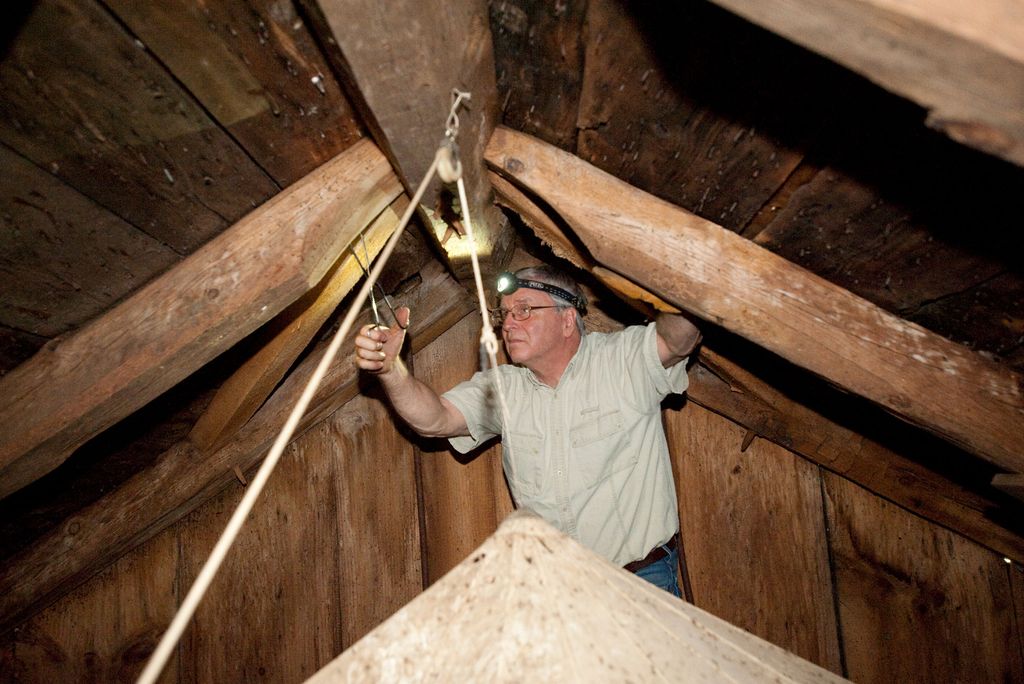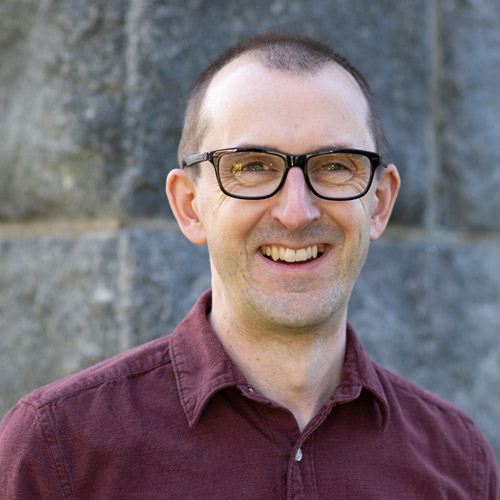Bat expert Thomas H. Kunz, a professor emeritus of biology, dies at 81

Thomas H. Kunz, a William Fairfield Warren Distinguished Professor, was an internationally renowned expert on bats who authored or coauthored more than 280 peer-reviewed papers. Photos by Vernon Doucette
Farewell to BU’s Bat Man
Thomas H. Kunz, a professor emeritus of biology and renowned bat expert, dies at 81
BU biologist Thomas H. Kunz was a world authority on bats. He studied them, taught classes on them, and campaigned for their preservation. But on Halloween, he always had a little fun with them. He’d put on a bat costume—fangs, cape, mask, and bat wing headdress. It didn’t matter where he was: if the august North American Society for Bat Research annual symposium fell on Halloween, Kunz would still wear his costume.
“We were at these big important meetings, and Tom, on the last day banquet of the conference, would be dressed up like a big bat,” says Aryn P. Wilder (GRS’14), who studied with Kunz and is now a researcher at the San Diego Zoo Institute for Conservation Research. “He did really adore bats, but he also loved people and he loved being silly. And so Halloween was a really important holiday for him, because it was a day that he could honor the animal that he loved the most, but also just have fun with people.”
At BU, Kunz, a College of Arts & Sciences professor emeritus of biology, was a leader and an inspiration to both students and fellow faculty, according to colleagues. But his 40-year career was cut short in 2011 when he was hit by a car in Toronto, Canada, while attending the Annual Symposium on Bat Research. He suffered a serious head injury and never returned to teaching. Kunz died on April 13, 2020, from COVID-19. He was 81.
International reputation
Kunz was especially well-known for his study of white-nose syndrome, a disease that has devastated North American bat populations. He authored or coauthored more than 280 peer-reviewed papers on the ecology, behavior, evolution, and conservation biology of bats. A fellow of the American Association for the Advancement of Science, he was also a past president of the American Society of Mammalogists and a recipient of its highest award, election to honorary membership.
“Tom had an international reputation,” says Fred E. Wasserman, a CAS associate professor of biology, who had worked with Kunz since the late 1970s. “He was extremely bright, he was very kind, and very, very supportive of all his colleagues and students—and with a sense of humor. Just a wonderful mentor and friend.”
At BU, Kunz was known as Bat Man to students and faculty. He once told BU Today that he was proud of the nickname, because “it gives me the opportunity to tout the value of these misunderstood and often unappreciated animals.”
He served as chair of biology, launched the University’s Center for Ecology and Conservation Biology, cofounded the Tiputini Biodiversity Station in Ecuador, and worked with architects to help design the Biology Research Building.
“Tom was an important leader at Boston University,” says Richard B. Primack, a CAS professor of biology. “He not only had this enthusiasm, but he was very successful at implementing things—he knew how to get things done administratively and financially.”
Kunz also made the biology department feel more like a family than a place of work, says longtime colleague James Traniello.
“When I first started at BU,” says Traniello, a CAS professor of biology, “we behavioral ecologists were all together in the basement of 2 Cummington, and there formed a family built on academics and friendship, which we will now sorely miss because Tom isn’t with us anymore.”
Kunz was quick to welcome others into the BU family—and into his own. When Michael D. Sorenson, a CAS professor of biology, joined BU in 1998, Kunz was chair of his hiring committee. During Sorenson’s second visit to BU, he stayed with Kunz at his home—and helped Kunz’s daughter, Pamela, move apartments. Sorenson had not yet been formally hired by BU.
“We were both Midwesterners, and basically, I was already family and I was happy to spend the morning helping to move his daughter. We went back to Tom’s home in Wellesley and ate peanut butter and jelly sandwiches,” Sorenson says.
When they finally did work together, Sorenson came to admire Kunz’s ability to inspire others—even fellow professors—with his knowledge and enthusiasm for science.
“In the early 2000s, we had a couple of annual departmental retreats at the Sargent Center up in New Hampshire,” says Sorenson, now CAS associate dean of the natural sciences faculty. “And he could take a group out walking through the woods and find one fascinating thing to talk about after another, whether it was a fungus consuming a tree or a burrow of some animal. He just had this incredible knowledge of the natural world, and it was so easy for him to engage a group of people and get them excited about it.”
Enthusiasm and energy
Kunz always involved students, undergraduate and graduate, in his bat research, taking them into caves and barns in the middle of the night. Even as fatigue crept up on his young charges, Wilder says, he was still full of energy. She found it inspiring.
“It was just so clear how much he loved the subject, how much he loved being in the field, and it was really an infectious level of energy, even late at night,” she says. “He was an amazing mentor to so many.”

“People around him wound up learning a lot about bats, because he was always talking about bats and being enthusiastic about bats,” says Primack. “Not only was he probably the world’s authority on bats, but there were always people visiting him about bat research, so the department developed all this knowledge of bats. I know so much about bats because of working with him.”
His family were drawn into his research, too. Kunz’s wife, father, and children all joined him in the field. His daughter recalls overnight trips with her dad to New England barns to measure, count, and band bats.
“I’m in science because of him,” says Pamela Kunz, who visited BU’s field stations in New Hampshire and Ecuador with her father. Today, she’s a physician in California. “He was able to blend his professional life and family life, which I think was great. My mom always loved to say that his work was his hobby, that he just loved what he did so much. And I think that’s so unique. I don’t know that a lot of us can say that.”
In 2011, Kunz was named a William Fairfield Warren Distinguished Professor, BU’s highest faculty honor. Announcing the award, President Robert A. Brown called Kunz “an exemplary researcher, scholar, teacher, and faculty leader.”
The Toronto symposium was later that year. The morning of the accident, Kunz mailed a letter to his eldest grandchild, then six.
“He wrote my son a letter saying, ‘I’m sending you a picture of a fruit-eating bat.’ It was right before Halloween and he wanted my son, who was then in first grade, to show this picture of the bat to his class,” says Pamela Kunz. “He really tried to instill a love of what he did to his family and his students. And I think that’s a thread that goes through.”
After the accident, Kunz’s current and former students established a fund in his name. The permanently endowed Thomas H. Kunz Fund in Biology, which still accepts gifts, has allowed students to travel overseas for fieldwork and to complete PhD research.
From college football to spelunking
Kunz’s fascination with the natural world began as a child. Born in Kansas City, Mo., he was an Eagle Scout and later recalled a childhood of capturing moth larvae with his brother and fishing trips with his father. His mother had been raised on a dairy farm, and Kunz spent a couple of teenage summers working on his uncle’s farm; he once wrote that his dream was to become a rancher. For a while though, nature had to compete with sports. A high school athlete, Kunz was a football cocaptain at the University of Central Missouri, where he double majored in physical education and biology.
After college, Kunz taught high school biology before finding opportunities for research fieldwork and further study—including, for the first time, on bats.
“He spent a lot of time doing very active things,” says Pamela Kunz. “And one of his favorites was spelunking, going around in caves. He did lots of rock climbing and active things outdoors, and I think that led him to the discovery that these bats were in caves and how fascinating they were.”
He would go on to earn advanced degrees from Drake University and the University of Kansas. In 1971, he joined BU as an assistant professor.
“In the pursuit of a career in mammalogy, I have crawled, I have walked, I have run, and I have tried to reach for the sky. I have also fallen,” Kunz wrote in a 2005 autobiography for the collection Going Afield: Lifetime Experiences in Exploration, Science and the Biology of Mammals. “My pathway to a career in mammalogy has been at times filled with bumps and turns, yet each time I have pulled myself up to try again. To achieve the highest of success in any career, one must figuratively learn to fly. My career choice to become a mammologist has allowed me to fly.”
Kunz is survived by his wife, Margaret Kunz; his daughter, Pamela Kunz, and son-in-law, Jeffrey Kwan; his son, David Kunz (CAS’98), and daughter-in-law, Nicole Kunz; and grandchildren, Oliver, Eliot, and Austin Kwan and Jackson and Grey Kunz.

Comments & Discussion
Boston University moderates comments to facilitate an informed, substantive, civil conversation. Abusive, profane, self-promotional, misleading, incoherent or off-topic comments will be rejected. Moderators are staffed during regular business hours (EST) and can only accept comments written in English. Statistics or facts must include a citation or a link to the citation.